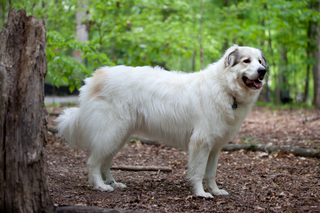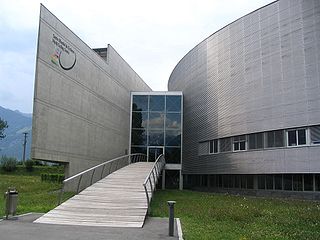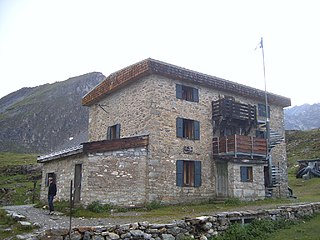
Lausanne is the capital and largest city of the Swiss French-speaking canton of Vaud. It is a hilly city situated on the shores of Lac Léman, about halfway between the Jura Mountains and the Alps, and facing the French town of Évian-les-Bains across the lake. Lausanne is located 62 kilometres northeast of Geneva, the nearest major city.

The Pyrenean Mountain Dog or Chien de Montagne des Pyrénées is a French breed of livestock guardian dog; in France it is commonly called the Patou. It originates from the eastern or French side of the Pyrenees Mountains that separate France and Spain and is recognised as a separate breed from the Mastín del Pirineo or Pyrenean Mastiff from the Spanish side of the mountains, to which it is closely related.

The International Cycling Union is the world governing body for sports cycling and oversees international competitive cycling events. The UCI is based in Aigle, Switzerland.

Deux-Montagnes is a suburban municipality in Southwestern Quebec, Canada on the north shore of the Rivière des Mille Îles where it flows out of Lake of Two Mountains. It is part of the Deux-Montagnes Regional County Municipality in the greater Montreal region. It is located 40 kilometres (25 mi) from Montreal.

The International Union of the Guides and Scouts of Europe - Federation of Scouts of Europe is a traditional faith-based Scouting organization with 20 member associations in 17 European countries and also in North America, serving roughly 65,000 members. The organization, headquartered in France, was founded in 1956 by a group of German and French Roman Catholic Scoutmasters as a faith-based Scouting movement, in order to reconcile the European peoples in the aftermath of the Second World War.

The Scouting and Guiding movement in Belgium consists of 15 to 20 separate organizations serving about 160,000 members. Nearly all organizations are grouped by languages and confessions. The Crown Scout rank is the highest a Boy Scout can achieve.

A mountain guide is a specially trained and experienced professional mountaineer who is certified by local authorities or mountain guide associations. They are considered to be high-level experts in mountaineering, and are hired to instruct or lead individuals or small groups who require this advanced expertise. This professional class of guides arose in the middle of the 19th century when alpine climbing became recognized as a sport.
Scouting and Guiding in Switzerland is made up of numerous scouting and guiding bodies which act to provide the opportunities to scout. This could be though Swiss national Scouting and Guiding organizations, through independent troops or through international troops established in Switzerland. While the latter two are similar, there is a fundamental difference because the three independent groups while taking guidance under different national regimes it is a program developed by people in the various cities, where the presence of international groups in Switzerland is a top down targeted programs that have been developed to offer expatriates scouting and guiding in the language they are used to and are developed in areas with a larger expatriate community. All of which are supported the existence of KISC and Our Chalet, both acting as semi-permanent jamborees.

The International Luge Federation (French: Fédération Internationale de Luge de Course(FIL); German: Internationaler Rennrodelverband) is the main international federation for all luge sports. Founded by 13 nations at Davos, Switzerland in 1957, it has members of 53 national luge associations as of 2009 and is based in Berchtesgaden, Germany. In reaction to the 2022 Russian invasion of Ukraine, in March 2022 the FIL banned all Russian athletes, coaches, and officials from its events, suspended all Russian officials appointed to its Commissions and Working Groups, and deemed Russia ineligible to host any of its events.

The Union of International Mountain Leader Associations (UIMLA) was founded in November 2004. It was decided at the meeting that all mountain leader associations would be awarded the same carnet and badge giving an internationally recognised identity. It also paves the way for other countries from around the world to join UIMLA setting a world standard for mountain leaders. The principal aims of UIMLA are:

The International Catholic Conference of Scouting (ICCS) is an autonomous, international body committed to promoting and supporting Catholic Scout associations and to be a link between the Scout movement and the Catholic Church. Its headquarters is located in Rome, Italy.

The Fédération Française des clubs alpins et de montagne (FFCAM) is a federation of clubs promoting mountain sports. It offers multiple training programs and courses to help people understand mountains and manages 142 mountain huts, mostly in the Alps and the Pyrenees.
Asiemut is a Canadian documentary film depicting the 8,000 kilometres (5,000 mi) cycling and philosophical journey of a young French Canadian couple from Mongolia to India. It was entirely filmed, directed and produced by Olivier Higgins and Mélanie Carrier. Asiemut has won 35 prizes in festivals around the world.
The 2007 European Championship of Ski Mountaineering was the seventh European Championship of ski mountaineering and was held in Avoriaz, Morzine between the Mont Blanc and the Lac Léman from March 24–28.
NORMAPME or European Office of Crafts, Trades and Small and Medium-sized Enterprises for Standardisation was created in 1996 by UEAPME with the support of the European Commission. The German name is: Europäisches Büro des Handwerks und der Klein- und Mittelbetriebe für Normung.
The Fédération internationale catholique d'éducation physique et sportive (FICEP) is an international nongovernmental organization (INGO) which governs all Catholic sports associations. The FICEP was founded between 1906 and 1911, under the auspices of the Italian federation FASCI, the Belgium federation FBCG, and the Fédération sportive et culturelle de France. Its development has mainly been confined to Europe, in spite of various and recurrent attempts to increase its geographical expansion after World War II.
The International Federation of Associations of Classical Studies (FIEC), or Fédération internationale des associations d'études classiques (FIEC) is an international association of Classical Studies associations all over the world. It encompasses national and international associations promoting the development of Classical philology, Latin, Ancient Greek, Classical archaeology, papyrology, paleography, epigraphy, numismatics, among other subjects. It was founded in Paris in 1948 at the UNESCO, where its associated journal, L'Année philologique, was also based. It currently has members in 46 countries, encompassing more than 60 national and regional associations and 14 international organizations of classical studies.

Charles Egmond d'Arcis was a Swiss journalist and alpinist. He was the first president of the International Climbing and Mountaineering Federation (UIAA).
Anarchism in Switzerland appeared, as a political current, within the Jura Federation of the International Workingmen's Association (IWA), under the influence of Mikhail Bakunin and Swiss libertarian activists such as James Guillaume and Adhémar Schwitzguébel. Swiss anarchism subsequently evolved alongside the nascent social democratic movement and participated in the local opposition to fascism during the interwar period. The contemporary Swiss anarchist movement then grew into a number of militant groups, libertarian socialist organizations and squats.













